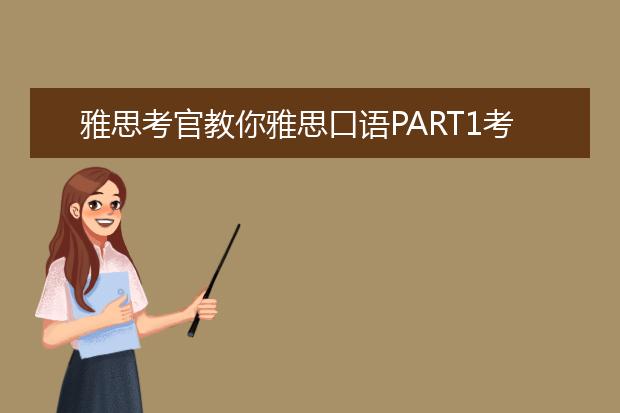雅思无忧小编给大家带来了4月雅思口语part1考试预测 雅思考官教你雅思口语PART1考试技巧相关文章,一起来看一下吧。
本文目录一览:

雅思考官教你雅思口语PART1考试技巧
上海环球青藤为大家带来一份由雅思考官写的雅思口语part1考试技巧,各位考生可以根据雅思口语考官的建议来准备雅思口语考试。希望对大家雅思口语备考有所帮助。IELTS is set into three sections.
Part 1 is generally something about you, where you are from, do you like something, what do you think of something etc.
So you can prepare before the test to answer some of these questions. Of course you can't prepare for all things, as the examiner may throw in a few curve balls (tricky). This exchange of questions is going to be about 5 minutes.
When asked a question, for example, “Where is your hometown?” you might answer“Shanghai” This is correct but hardly a worthy answer that will convince the examiner to expect a lot from you.
Give the place and then say something about it as this shows you can engage in a conversation and not just regurgitate (give) facts and names. Maybe say something about the city, location, size, the fact you might not know much about it because you left at a young age.
“I come from China's largest city Shanghai, on the coast; do you know the area of Minhang in Shanghai? That is the part of Shanghai I was born”
A bit more than just one word.
Chances are you will get a follow up question as this is a conversation and in conversations you garner (get) information from those you are talking too.
“Can you describe… to me” or “How has the city changed” or “What do you like/don't like… about…” or “What are the people like” or "Who lives in your neighbourhood" or"Where do you buy groceries"
Answer how you feel. This isn't a test on facts, if you lie all the way through then be prepared as lying or non-truths can come back to haunt you.
“I come from the state of Nanjing in Beijing, next to India” Completely wrong but no one is taking notes on that. You will get a follow up question about it so chances are you will have todig yourself out of that hole (talk your way out of a lie). The truth is often easier to talk about.
There is a good chance you will also be asked about school or work as that is one of the main questions asked to someone you don't know.
If you are in school then maybe something about enjoying school or not enjoying school or maybe something about a topic in school, why do you study that?
If you are working then questions about what your job might be, how long have you been there, do you like it, will you stay long?
Again you don't have to tell the truth, maybe just half truths in case you feel you shouldn't give out too much information.
“I am an International spy here to assassinate you”
If you feel uncomfortable about a question then, just as in a conversation, say so and give the reason in a polite way. Politeness goes a long way. The examiner will understand as they are nice people and will try to reword the question so it isn't so invasive (direct) but they will also be able to tell if you are saying that just to bypass a question you find difficult or just don't like.
Other questions are likely to be about basic everyday things. Something about your family, neighbours, workmates, perhaps the weather or something to do with food or shopping. These are everyday things, or what you might ask someone you just met. Every question will likely have a follow up related to them. They are direct questions about the topic.
So food questions may deal with local dishes or if you like sweet food or who should do the cooking and why?
Something about your family might be the size of the family, what someone in the family does, your role in the family etc.
Be clear and precise, don't go off topic too much and don't repeat, don't repeat what you want to say. Be yourself, take a deep breath before you speak and if you spend a second thinking about it before you start talking, then nod in acknowledgement to the question. A little dead air for a second or two is fine as that is natural in conversations. A second or two, not five or 10 seconds.
Here are some other topics to think about. You can probably answer questions on them in your native tongue so now practice using English only.
Family, Language, your routine, holidays and festivals, travel, sport, Foreigners in China, Entertainment like TV and reading, cultural areas like art and architecture.
There is something called the 5Ws of Who What Where When Why and How. Basic words used to gather information. Maybe 'Have' and 'Will' should be in there too.
Pick a topic and try making questions using the Ws along with how, have and will. This isn't how questions are chosen but it is good way to practice and to help you anticipate the next question.
Like Sun Tzu says, "If you know your enemies and know yourself, you will not be imperilled in a hundred battles... if you do not know your enemies nor yourself, you will be imperilled in every single battle." The questions are the battle not the examiner.
雅思机经:2023.4.21 雅思口语Part1机经考题
您好,我是专注留学考试规划和留学咨询的小钟老师。在追寻留学梦想的路上,选择合适的学校和专业,准备相关考试,都可能让人感到迷茫和困扰。作为一名有经验的留学顾问,我在此为您提供全方位的专业咨询和指导。欢迎随时提问!
下面是2023年4月21日雅思口语Part1机经的内容,包括了这次考试中的关于个人信息,家乡,体育,语言等方面的话题。这次的雅思口语Part1考题出现了很多以往的经典考题,并进行了详细的分类,大家可以一起来参考一下。
Part 1考题总结
Personal information & Introduction
What’s your name?
Are you a student?
What is your major?
Are your working or studying?
How did you choose your major?
Is your major the most popular one in China?
Hometown
Where are you from?
Where’s your hometown?
Where do you live?
Is your hometown a place that the young people like to live in?
Is it very noisy near your apartment?
Jobs
Why did you choose this career?
Do many Chinese people shift jobs in a year?
What kind of job would you like to do in the future?
What kinds of job are popular in China?
Education
Which university are you in?
Why did you choose this university?
What’s your major?
Which is your favorite part?
Did you parents choose the school for you?
What is the best subject in your school?
Hobbies
What do you do in your free time?
Do you like collection?
What do you collect?
Do you like dance? Why?
What do you do at weekend?
Weather
What kind of weather do you like?
Which season is your favorite?
What the weather like in your hometown?
Sports
What sport did you like when you were a child?
Which sport is the most popular in China?
What are the differences between the women’s and men’s sport?
Do you like walking?
What is your favorite sport?
Telephone:
Do you use telephone?
Do you prefer making phone calls or sending short messages?
What are the benefits of having a mobile phone?
Language:
Can you speak another language?
What are the benefits of speaking a second language?
Why so many Chinese are trying to learn English?
Birthday
How do you celebrate birthday with your friends?
Which birthday is important to you?
House
What kind of room are you living in?
Which part is your favorite in your house?
What does your dreaming house look like?
Do you usually invite your friends to your house?
Do you prefer to live in apartment or house?
Do you like inviting friends to your home?
Food:
What is your favorite food?
What kinds of food are popular in China?
Travel:
What kinds of school did you ever visit?
Which is the most impressive?
Do you like visiting parks?
Clothing and fashion
What kind of clothes are in fashion this year?
What kinds of clothes do the young people prefer?
Email and letter
Do you like sending emails or letters? Why?
Which one do the old people prefer ?
Activities
What did play when you were a child?
What is the most popular game for children in China?
What are you going to do this weekend?
Do you like making new friends?
Do you surf the internet?
Others
Is there any difference between the young and the old regarding saving money?
Where do you meet new people?
希望以上的答复能对您的留学申请有所帮助。如果您有任何更详细的问题或需要进一步的协助,我强烈推荐您访问我们的留学官方网站
,在那里您可以找到更多专业的留学考试规划和留学资料以及*的咨询服务。祝您留学申请顺利!
2023年4月21日雅思口语Part1机经预测
您好,我是专注留学考试规划和留学咨询的小钟老师。在追寻留学梦想的路上,选择合适的学校和专业,准备相关考试,都可能让人感到迷茫和困扰。作为一名有经验的留学顾问,我在此为您提供全方位的专业咨询和指导。欢迎随时提问!
对于正在准备雅思考试的同学们来说,还是可以了解一下雅思预测题的,那么今天就和小钟老师一起来了解一下2023年4月21日雅思口语Part1机经预测。
雅思口语part 1新题
Advertisements (新题)
1. Are there many advertisements in your country?
2. Why do you think there are so many advertisements now?
3. How do you feel about advertisements?
4. Do you like advertisements?
5. What kind of advertisement do you like the most?
6. Do advertisements (ever) influence your choice about what to buy?
7. Where can we see advertisements?
8. What are the various places where we see advertisements?
9. Do you prefer advertisements on TV or those in magazines?
10. What do you think is the purpose of advertisements)?
11. What do you think about the developments in advertising in China today?
Animal (新题)
1. Why do some people keep pets at home?
2. What kinds of animals do you like?
3. Have you ever had a pet before?
4. Do you like to see animals in the zoo?
5. What is the most popular animal in China?
Sleep (新题)
1. How many hours are you asleep for every day?
2. Is it necessary to take a nap every day?
3. Do old people sleep a lot? Why?
4. What time do you usually go to bed?
5. Do you always have a good sleep?
Daily Routine (新题)
1. What part of your day do you like best?
2. What's your daily routine?
3. What is the busiest part of the day for you?
4. What's the difference of routine between you and your teenager's times?
Jewelry (新题)
1. What's your attitude toward jewelry?
2. What's kind of jewelry you like to buy?
3. Why so many people choose to buy expensive jewelry to maintain value?
4. How often do you wear jewelry?
Dictionary (新题)
1. How often do you use your dictionary?
2. Do you like paper dictionary or electronic dictionary?
3. What kinds of dictionaries have you used before?
4. How will dictionaries change in the future?
Gift (新题)
1. How often do you buy others gifts?
2. Do you like to send expensive gifts?
3. What kinds of gifts are popular in your country?
4. Why do people send gifts?
Swimming
1. Do you like swimming?
2. Is it difficult to learn how to swim?
3. Where do Chinese like to go swimming?
4. What's the difference between swimming in the pool and swimming in the sea?
News/ newspaper
1. Do you often read newspapers?
2. Are you very interested in the news?
3. Why do you want to know the latest news?
4. How important is it to you to get the news every day?
5. What sort of news are you most interested in?
6. Which do you prefer reading, magazines or newspapers?
7. What kinds of (types of) newspapers (or magazines) do you usually read?
8. How old were you when you first started to read newspapers?
9. Do you think it's important to read newspapers? (Why? / Why not?)
10. Why do (you think) people read newspapers?
11. What different types of newspaper are there in China?
12. Do you care about the news?
Handwriting
1. Do you usually write by hand or write using a computer (typewriter or word-processor)?
2. Nowadays, how do most people write things?
3. Do you think computers might one day replace handwriting?
4. When do children begin to write in your country?
5. How did you learn to write?
6. Do you think handwriting is very important (nowadays)?
7. How can children today improve (or, practice) their handwriting?
8. What impression does a person's handwriting have on other people?
Outdoor activities
1. What do you do in your spare time?
2. Do you like outdoor activities?
3. What outdoor activities do you (most) like to do?
4. How often do you do that?
5. What outdoor sports do you like? (Why?)
6. How much time do you spend outdoors every week?
7. How often do you do outdoor activities?
Music
1. When do you listen to music?
2. How much time do you spend listening to music every day?
3. What kinds of music do you like to listen to?
4. What's your favorite kind of music?
5. Have you ever been to a concert before?
Advertisement
1. Are there any TV channels in your country that don’t have adverts?
2. Do you enjoy watching adverts on TV?
3. What are the best ways for ordinary people to advertise something they want to sell in your country?
4. What is it that makes an advert effective?
5. What are the advantages to companies of advertising on the Internet rather than TV?
6. What things do advertising companies do that might give it a bad name?
7. Are advertisements important?
8. Do you watch advertisements on television or on internet?
9. Are there many advertisements in your country?
10. Why do you think there are so many advertisements now?
11. Where are the places we see advertisements?
12. How do you feel about advertisements?
13. What kind of advertisements do you like the most?
14. What type of advertisements do you prefer to use for getting information?
15. Do advertisements influence your choice of product?
16. Have you ever bought anything after seeing its advertisements?
17. What are the differences in advertisements on television and those in magazines?
18. What do you think is the purpose of advertisements?
19. Do you think advertising plays an important role in today’s world?
20. What sort of advertisements have a deeper impact on people?
21. Did you see any recent ad which had a deep impact on you?
Rainy days
1. Does it rain much in China? (Where? When?)
2. Is there any part of China where it doesn't rain much?
3. When (in what month/season) does it rain most in your hometown?
4. In which season does it rain most in other parts of China?
5. Can you remember any time when it rained particularly heavily in your hometown?
Computer
1. How often do you use computer?
2. What kinds of computers are popular in China?
3. What do you usually use your computer for?
4. Who taught you how to use a computer?
5. Do you think computers have changed your life a lot?
希望以上的答复能对您的留学申请有所帮助。如果您有任何更详细的问题或需要进一步的协助,我强烈推荐您访问我们的留学官方网站
,在那里您可以找到更多专业的留学考试规划和留学资料以及*的咨询服务。祝您留学申请顺利!
以上就是雅思无忧小编给大家带来的4月雅思口语part1考试预测 雅思考官教你雅思口语PART1考试技巧,希望能对大家有所帮助。
雅思培训
免责声明:文章内容来自网络,如有侵权请及时联系删除。


 雅思口语part1模板技巧 雅思考官教你雅思口语PART1考试技巧
雅思口语part1模板技巧 雅思考官教你雅思口语PART1考试技巧
 英雅思口语part1题库 雅思考官教你雅思口语PART1考试技巧
英雅思口语part1题库 雅思考官教你雅思口语PART1考试技巧
 雅思口语part1题库修理东西 雅思考官教你雅思口语PART1考试技巧
雅思口语part1题库修理东西 雅思考官教你雅思口语PART1考试技巧
 雅思口语part1只从题库抽吗 雅思考官教你雅思口语PART1考试技巧
雅思口语part1只从题库抽吗 雅思考官教你雅思口语PART1考试技巧
 雅思口语part1是固定题库吗 雅思考官教你雅思口语PART1考试技巧
雅思口语part1是固定题库吗 雅思考官教你雅思口语PART1考试技巧
 雅思口语题库 part1 雅思考官教你雅思口语PART1考试技巧
雅思口语题库 part1 雅思考官教你雅思口语PART1考试技巧
 雅思口语part1考试技巧 雅思考官教你雅思口语PART1考试技巧
雅思口语part1考试技巧 雅思考官教你雅思口语PART1考试技巧
 雅思口语part1真题分析 雅思考官教你雅思口语PART1考试技巧
雅思口语part1真题分析 雅思考官教你雅思口语PART1考试技巧
 雅思考官教你雅思口语PART1考试技巧
雅思考官教你雅思口语PART1考试技巧
 雅思面试怎么考的高分技巧 雅思考官教你雅思口语PART1考试技巧
雅思面试怎么考的高分技巧 雅思考官教你雅思口语PART1考试技巧